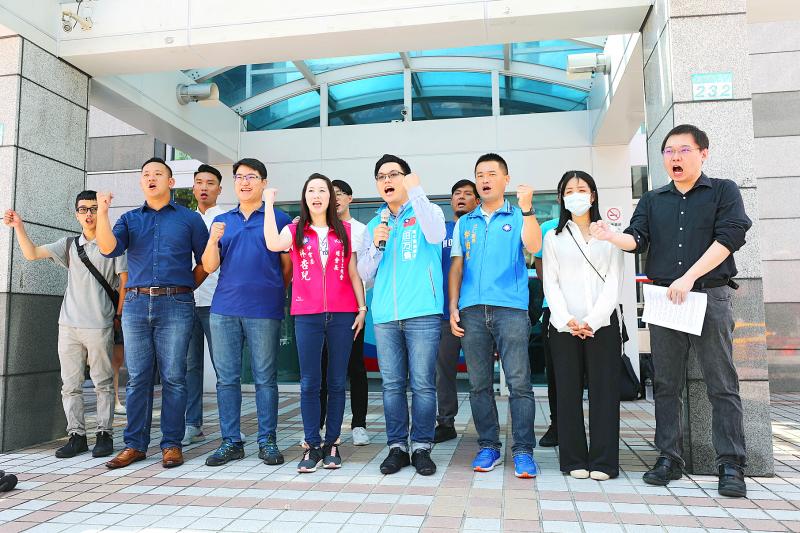Several members of the Chinese Nationalist Party (KMT) Reform Committee’s youth participation task force yesterday voiced their support for recommendations made by the committee’s cross-strait narrative task force and said they were not abandoning the “1992 consensus.”
The so-called “1992 consensus,” a term former Mainland Affairs Council chairman Su Chi (蘇起) in 2006 admitted making up in 2000, refers to a tacit understanding between the KMT and the Chinese Communist Party that both sides of the Taiwan Strait acknowledge there is “one China,” with each side having its own interpretation of what “China” means.
The KMT’s reform committee, of which KMT Chairman Johnny Chiang (江啟臣) is the general convener, is divided into four task forces focused on cross-strait narrative, organizational reform, youth participation and financial stability.

Photo: CNA
On Friday last week, the groups held their first joint meeting, during which the cross-strait narrative task force proposed “four pillars”: insisting on the sovereignty of the Republic of China (ROC); safeguarding freedom, democracy and human rights; prioritizing the safeguarding of Taiwan’s security; and creating a win-win situation and “shared prosperity.”
Speaking outside the KMT headquarters in Taipei yesterday, Taichung City Councilor Lo Ting-wei (羅廷瑋), a member of the youth participation task force, said that while some people who rely on history for a “sense of presence” might feel that their contributions are being erased, the committee was not erasing the “1992 consensus,” but rather hoped to add to the KMT’s narrative.
Lin Hsing-er (林杏兒), head of the KMT Department of National Youth Affairs and a member of the youth participation task force, said that young people are unfamiliar with the “1992 consensus.”
She compared the “consensus” to a point-and-shoot camera, saying it was no longer “in fashion.”
The KMT has never removed the “consensus” from its discourse, she said, but it should be repackaged into something that young people can understand.
Another member of the youth participation task force, Taipei City Councilor Hsu Chiao-hsin (徐巧芯), said that while some people question whether the KMT’s cross-strait narrative is moving closer to that of the Democratic Progressive Party (DPP), the reverse was true.
She said that the KMT should place its focus not on whether or not it wants the “1992 consensus,” but rather on the challenges the “consensus” faces and supervision of the ruling DPP.
Members of the youth participation task force also expressed their support for fellow member Kaohsiung City Councilor Jane Lee (李眉蓁), who on Tuesday was named the party’s candidate in the Kaohsiung mayoral by-election to be held on Aug. 15.
In related developments, former president Ma Ying-jeou (馬英九) yesterday on Facebook called on President Tsai Ing-wen (蔡英文) to acknowledge the “1992 consensus” to prevent the two sides of the Taiwan Strait from going to war.
Ma also called on Chinese authorities to stop menacing Taiwan with force.
Additional reporting by CNA

INVESTIGATION: The case is the latest instance of a DPP figure being implicated in an espionage network accused of allegedly leaking information to Chinese intelligence Democratic Progressive Party (DPP) member Ho Jen-chieh (何仁傑) was detained and held incommunicado yesterday on suspicion of spying for China during his tenure as assistant to then-minister of foreign affairs Joseph Wu (吳釗燮). The Taipei District Prosecutors’ Office said Ho was implicated during its investigation into alleged spying activities by former Presidential Office consultant Wu Shang-yu (吳尚雨). Prosecutors said there is reason to believe Ho breached the National Security Act (國家安全法) by leaking classified Ministry of Foreign Affairs information to Chinese intelligence. Following interrogation, prosecutors petitioned the Taipei District Court to detain Ho, citing concerns over potential collusion or tampering of evidence. The

‘FORM OF PROTEST’: The German Institute Taipei said it was ‘shocked’ to see Nazi symbolism used in connection with political aims as it condemned the incident Sung Chien-liang (宋建樑), who led efforts to recall Democratic Progressive Party (DPP) Legislator Lee Kun-cheng (李坤城), was released on bail of NT$80,000 yesterday amid an outcry over a Nazi armband he wore to questioning the night before. Sung arrived at the New Taipei City District Prosecutors’ Office for questioning in a recall petition forgery case on Tuesday night wearing a red armband bearing a swastika, carrying a copy of Adolf Hitler’s Mein Kampf and giving a Nazi salute. Sung left the building at 1:15am without the armband and apparently covering the book with a coat. This is a serious international scandal and Chinese

Seventy percent of middle and elementary schools now conduct English classes entirely in English, the Ministry of Education said, as it encourages schools nationwide to adopt this practice Minister of Education (MOE) Cheng Ying-yao (鄭英耀) is scheduled to present a report on the government’s bilingual education policy to the Legislative Yuan’s Education and Culture Committee today. The report would outline strategies aimed at expanding access to education, reducing regional disparities and improving talent cultivation. Implementation of bilingual education policies has varied across local governments, occasionally drawing public criticism. For example, some schools have required teachers of non-English subjects to pass English proficiency

TRADE: The premier pledged safeguards on ‘Made in Taiwan’ labeling, anti-dumping measures and stricter export controls to strengthen its position in trade talks Products labeled “made in Taiwan” must be genuinely made in Taiwan, Premier Cho Jung-tai (卓榮泰) said yesterday, vowing to enforce strict safeguards against “origin laundering” and initiate anti-dumping investigations to prevent China dumping its products in Taiwan. Cho made the remarks in a discussion session with representatives from industries in Kaohsiung. In response to the US government’s recent announcement of “reciprocal” tariffs on its trading partners, President William Lai (賴清德) and Cho last week began a series of consultations with industry leaders nationwide to gather feedback and address concerns. Taiwanese and US officials held a videoconference on Friday evening to discuss the